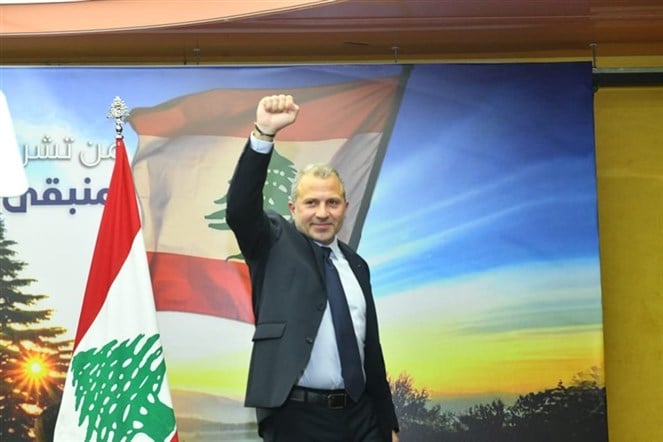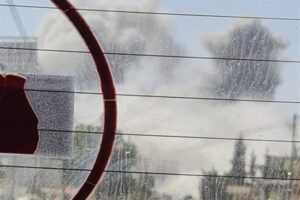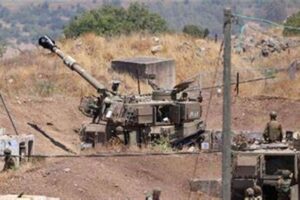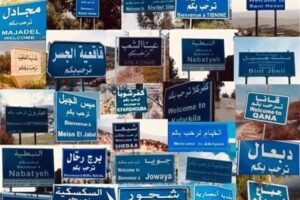“Freedom, sovereignty, and independence cannot be fragmented or attributed to anyone,” affirmed the head of the Free Patriotic Movement (FPM), MP Gebran Bassil, in his speech following the Holy Mass organized by the FPM to commemorate October 13.
On October 13, 2024, Bassil reiterated the FPM’s rejection of Israeli occupation, just as the party had rejected Syrian tutelage on October 13, 1990. He paid tribute to all Lebanese martyrs, including those who fell on October 13, and the martyrs of today’s resistance, currently fighting on the front lines.
Bassil then raised several concerns, including the dangers of displacement and attempts at creating sedition, urging the need to address the repercussions of Israeli aggression. He also emphasized the importance of electing a President through Lebanese consensus.
“In October 1990, we suffered a military defeat, but a national movement was born to liberate Lebanon, and Lebanon was indeed liberated in 2005. Today, in October 2024, if Lebanon falls again under Israeli occupation, it will inevitably be liberated once more, just like in 2000,” Bassil stated.
He argued that Israel has long been preparing for revenge since its defeat in the 2006 Lebanon War and that it needs no excuse to attack Lebanon. However, he added that supporting Gaza provided Israel with such an excuse, putting Lebanon in a position of self-defense rather than offense.
“We asked Hezbollah not to get involved in the war to support Gaza, as there was no legal basis for it. President Michel Aoun had expressed concerns about Lebanon and about Hezbollah. We continue to call for separating Lebanon from Gaza. Six months ago, we submitted written correspondence to several states and Lebanese officials, calling for a United Nations Ceasefire Resolution specific to Lebanon. While some Hezbollah supporters ignored this request, Lebanese officials and relevant states remained unresponsive. However, the demands outlined by the tripartite meeting and the Cabinet align with our request,” he explained.
Bassil called for a united Lebanese position advocating for a ceasefire that does not aim to facilitate Israeli occupation but to expose the enemy and prevent any attempts to seize Lebanese land.
“Israel’s plan has not changed since its founding. Its ideology is rooted in the legend, under biblical guise, of ‘Greater Israel,’ which seeks to gather the Jewish diaspora from the West and East and occupy the land of others, under the name of the ‘Promised Land,’ stretching from the Nile to the Euphrates, including part of Lebanon. Therefore, we stand today at the heart of the battle to prevent Israel from occupying our land again, despite rejecting the ‘unity of fields’ approach and its failures, along with the support for warfare that has proven ineffective, especially as Lebanon is now in need of protection.”
Bassil emphasized that Israel is not targeting Hezbollah alone but all of Lebanon’s land and people. “The FPM is deeply involved in the resistance, not only through humanitarian and societal solidarity but also through political and diplomatic activism, and national unity,” he said.
He expressed concern about Israel’s systematic destruction of buildings and the displacement of people, which he described as a deliberate tactic to prevent them from returning home. “Israel has specialized in population transfer, as it did with Palestinians since 1948, and continues today in Gaza, and perhaps tomorrow in the West Bank. Now, it is launching the same operation against Lebanese people, particularly Shiites in the South, Bekaa, and Beirut’s southern suburbs, to push them towards Mount Lebanon, the North, or even Syria, Iraq, and Iran.
“Emptying Lebanon of its Shiite population is a plot to deprive the country of one of its fundamental communities, thereby undermining its existence. This is not just about tearing apart Lebanon’s diverse and rich social fabric; it’s about preparing for internal chaos, sectarian strife, and civil war. Any attempt to isolate or weaken the Shiite community will sabotage Lebanon and harm all its components,” Bassil warned.
He urged against participating in plans that seek to divide Lebanon’s people, undermine their unity, or fragment the country. “This is what Israel wants because it views Lebanon’s opposition to its unilateralism as a threat to its existence. Israel seeks to surround itself with feuding sectarian statelets in Syria, Iraq, and Lebanon, a plan it has pursued since 1975,” he stated.
Bassil stressed the importance of confronting this plan by preserving Lebanon’s diversity and unity, addressing the demographic changes caused by displacement, and supporting displaced populations until they can return home safely.
He also called for continued vigilance in exposing those attempting to drag Lebanon and its people into divisive and costly conflicts, as well as urging the military, security agencies, and citizens to protect the security of all Lebanese people and prevent sectarian sedition.
In a warning to the international community, Bassil stated that in the event of prolonged Israeli occupation, all forms of weaponry, including non-state arms, would be legitimized, as they would become necessary for Lebanon’s self-defense. He also pointed out that long-term occupation would turn Lebanon into a battleground for fighters from various countries, thereby undermining the State and preventing lasting stability.
“A prolonged occupation means ongoing displacement, further complicating Lebanon’s internal stability and leading to the breakdown of the State’s structure, which could fuel further armament and self-protection among different Lebanese groups,” he added.
Bassil affirmed Lebanon’s central role in the Arab-Israeli conflict and the need to regain its lost rights, halt attacks, and secure the return of displaced Syrians and Palestinian refugees. However, he expressed concern that Lebanon has now become a battleground for an Iranian-Israeli conflict, where both sides manipulate the country’s resources and people.
“We must never compromise the sovereign decision of the Lebanese State and should call for the full implementation of UN Resolution 1701 by both Israel and Lebanon. It is time for the Lebanese people to prioritize their nation’s interests over those of external parties,” he stressed.
Bassil outlined three primary goals for Lebanon: first, a secure and stable country defended by its army under a comprehensive defense strategy; second, a sovereign Lebanon of 10,452 km2, whose people are not used as soldiers or border guards for others; and third, a neutral Lebanon, free from external conflicts that do not serve its interests.
Bassil stated that Lebanon had lost its deterrent power due to involvement in the Gaza conflict, leaving the country exposed to further threats. He noted that Israel excels in military escalation, while Lebanon’s resistance lacks comparable destructive capabilities to stop Israeli aggression.
While other members of the axis did not directly intervene to support the resistance, parties from the opposing axis, led by the U.S., have actively intervened and engaged with Israel. It has become evident that Iran does not consider Lebanon part of its national security priorities. Although eliminating Hezbollah is a red line Iran will not cross, it has still refrained from engaging in a direct war to prevent Lebanon’s destruction, prioritizing its own national security and nuclear program. Meanwhile, Israel, its allies, and internal supporters miscalculated if they believed Hezbollah had lost its ability to defend Lebanon’s territory,” Bassil explained.
He went on to say that despite these challenges, there is still a possibility to recalibrate the balance of power through an alternative system to the resistance’s lost deterrence.
“This alternative lies in the Lebanese State, which can consolidate the remaining strengths of the resistance and reinforce them with a strong national army, one that the international community agrees to arm to ensure stability both at the borders and within the country. This approach would be supported by a new international ceasefire resolution based on UN Resolution 1701, and guaranteed by a local, international, and regional agreement that protects Lebanon’s sovereignty and neutrality from external conflicts. All of this must be underpinned by national unity, which will shape Lebanon’s future role through dialogue led by the President of the Republic, alongside a national salvation government,” Bassil explained.
Regarding the Presidential file, Bassil expressed deep sorrow over the war’s losses, particularly the death of an extraordinary leader like Sayyed Hassan Nasrallah, and the injuries and martyrdom of thousands of Lebanese people. “What grieves me the most is that many politicians seem unaware of our collective responsibility to save our country,” he added.
He questioned, “Is it reasonable that, despite all that is happening, some parties don’t feel the urgency to establish a constitutional authority to lead the Lebanese people during the war and negotiate honorable solutions on their behalf? Is it acceptable that some parties are indifferent to weakening the Lebanese people’s resilience by delaying the election of a President until after a ceasefire? Do they not realize that Netanyahu will never agree to a ceasefire until he turns Lebanon into another Gaza? And that Israel will prevent the election of a President and may even resort to aggression to obstruct it?”
Bassil then pointed out that there are those seeking to delay the Presidential election, hoping that Israel will eventually control Lebanon’s decisions and impose their candidate as President. “They seem to have learned nothing from the past,” he added.
To those pushing for such delay, Bassil posed a direct question: “Haven’t we endured enough for you to understand that victory cannot be achieved without the State? Losing to Israel is not just a loss for one political party, but for Lebanon as a whole—its nation and its people.”
To the second group, he noted that the war had exposed those willing to compromise sovereignty and abandon the land in exchange for empty promises of authority or illusions of power. These individuals, Bassil argued, are traitors drawn to betrayal, cheerleading for the aggressor, advocating for occupation, and promoting plans for the displacement of our people.
As for those betting on a new occupation, Bassil warned them, reminding them that history will not turn back, and even if it did, it would only bring the same painful end and great losses endured by all. “Don’t think that with occupation, you will succeed in imposing your divisional agenda. Let us learn from the past.”
Bassil reaffirmed the FPM’s belief in Lebanon’s unity and in a State led by a President who brings all Lebanese people together. “We are in communication with all parliamentary blocs to search for candidates who can be accepted by all Lebanese parties,” Bassil affirmed.
“We will reach out to active states to assist our displaced people, exert pressure for an international ceasefire resolution, and gain external support to preserve Lebanon’s stability, primarily through the election of a President. This President cannot be imposed upon us under the pretense that Israel will prevail over Lebanon, nor can his election be delayed on the grounds that the axis has not yet been compensated during this war. Israel has not won, and the axis cannot be rewarded in this context,” Bassil clarified.
“We need a President who can turn this devastating war into an opportunity to rebuild the State and strengthen it. We need a President who understands that the displacement of over one million Lebanese civilians is a chance to return more than one million displaced Syrians to their homeland. Already, 330,000 Syrians have returned without facing obstacles from Lebanon, Syria, or the UN. We need a President who knows that the challenge is to protect Lebanon’s unity and address attempts to isolate any Lebanese community. We must protect one another from danger, rather than silently observe each other’s suffering. We must defend our country according to the Constitution and the Taif Agreement, and ensure our safety through legitimate constitutional authority, not through militias.”
Bassil reiterated the FPM’s commitment to finding a consensus candidate for the Presidency and called for continued efforts to seek international support for Lebanon’s stability, primarily through the election of a President.
Finally, Bassil paid tribute to journalists risking their lives to report on Israeli atrocities and praised those working with patriotism and humanity to rebuild Lebanon.




